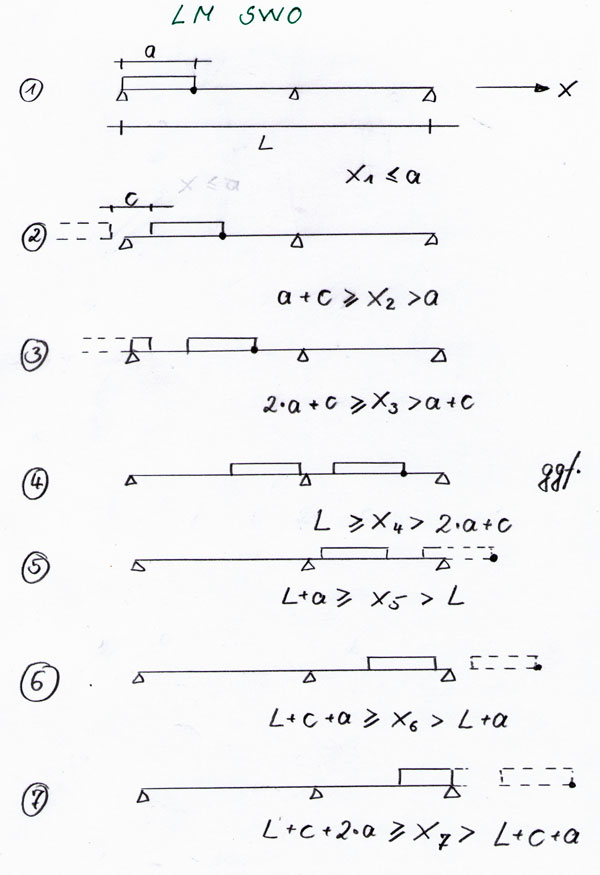C Schwerlastmodell SW/0: Unterschied zwischen den Versionen
Lutz (Diskussion | Beiträge) |
Lutz (Diskussion | Beiträge) |
||
| Zeile 41: | Zeile 41: | ||
let#lf 301 | let#lf 301 | ||
let#ph 0 $ ohne Fliehkräfte | let#ph 0 $ ohne Fliehkräfte | ||
#define sw0 | <nowiki>#define sw0</nowiki> | ||
loop#1 #n | loop#1 #n | ||
if (#x<#a) $ nur der erste Teil und dieser auch nicht ganz vollständig | if (#x<#a) $ nur der erste Teil und dieser auch nicht ganz vollständig | ||
| Zeile 122: | Zeile 122: | ||
let#x #x+#dx | let#x #x+#dx | ||
endloop | endloop | ||
#enddef | <nowiki>#enddef</nowiki> | ||
#include sw0 | <nowiki>#include sw0</nowiki> | ||
s.a.: C:\Glossar\S\Sofiload_V\lastcopy: bahnlasten | |||
[[Kategorie:Bahn]] | [[Kategorie:Bahn]] | ||
[[Kategorie:SOFiLOAD]] | [[Kategorie:SOFiLOAD]] | ||
Version vom 13. Februar 2020, 08:30 Uhr
Allgemeines
Für die meisten Bahnbrücken muss neben dem LM71 auch das Lastmodell SW/0 nachgewiesen werden. Dabei sind je Gleis die zwei möglichen Exzentrizitäten sowie die zwei möglichen Geschwindigkeiten zu untersuchen.
Die nachstehende Grafik zeigt die 7 "Grenzstellungen" der beiden Streckenlasten. Hier kommen die Werkzeuge:
loop
if
elseif
elseif
...
else
endif
endloop
zum Einsatz.
Bei den logischen Vergleichen muss ganz streng "geklammert" werden!
Grafik
Die Phase 1 und 7 muss man üblicherweise nicht so unterteilen. Da sollte es genügen, die volle Länge "a" zu belasten.
Block SW0
!*!Label SW/0 let#pv 133 $ kN/m let#ph 23.27/#alpha $ kN/m let#ez -2.558
let#c 5.3 let#a 15 let#l #l1+#l2 $ 37m let#n 40 $ Anzahl der Laststellungen let#dx (#l+#c+2*#a-1)/#n $ 1.78m
let#x #dx $ Startwert
!*!Label SW0 Vertikallast e_min let#ey 0.156-0.083 let#text 'V: SW/0 e=min' let#lf 301 let#ph 0 $ ohne Fliehkräfte #define sw0 loop#1 #n if (#x<#a) $ nur der erste Teil und dieser auch nicht ganz vollständig
lf nr #lf typ 'SW0' bez #text
let#aa 0
let#ll #x
txa Fall 1: x<a
txa lf #(#lf,4.0)
txa x #(#x,7.3)
stab von 'grp' bis 1 typ 'pzz' pa #pv a #aa l #ll eya #ey[m] eza #ez[m] mess 'S'
stab von 'grp' bis 1 typ 'py' pa -#ph a #aa l #ll eya #ey[m] eza #ez[m] mess 'S'
elseif ((#x>#a) & (#x<=(#a+#c))) $ der erste Teil schon komplett drauf, der zweite noch nicht
lf nr #lf typ 'SW0' bez #text
txa Fall 2: x>a & x<=a+c
txa lf #(#lf,4.0)
txa x #(#x,7.3)
let#aa #x-#a
let#ll #a
stab von 'grp' bis 1 typ 'pzz' pa #pv a #aa l #ll eya #ey[m] eza #ez[m] mess 'S'
stab von 'grp' bis 1 typ 'py' pa -#ph a #aa l #ll eya #ey[m] eza #ez[m] mess 'S'
elseif ((#x<(2*#a+#c)) & (#x>=(#a+#c))) $ der erste Teil schon komplett drauf, der zweite nur teilweise
lf nr #lf typ 'SW0' bez #text
txa Fall 3: x>a+c & x<=2a+c
txa lf #(#lf,4.0)
txa x #(#x,7.3)
let#aa #x-#a
let#ll #a
stab von 'grp' bis 1 typ 'pzz' pa #pv a #aa l #ll eya #ey[m] eza #ez[m] mess 'S'
stab von 'grp' bis 1 typ 'py' pa -#ph a #aa l #ll eya #ey[m] eza #ez[m] mess 'S'
let#aa 0
let#ll #x-(#a+#c)
stab von 'grp' bis 1 typ 'pzz' pa #pv a #aa l #ll eya #ey[m] eza #ez[m] mess 'S'
stab von 'grp' bis 1 typ 'py' pa -#ph a #aa l #ll eya #ey[m] eza #ez[m] mess 'S'
elseif ((#x<#l) & (#x>=(2*#a+#c))) $ beide Teile komplett drauf
lf nr #lf typ 'SW0' bez #text
txa Fall 4: x>=l+2a+c & x<l
txa lf #(#lf,4.0)
txa x #(#x,7.3)
let#aa #x-#a
let#ll #a
stab von 'grp' bis 1 typ 'pzz' pa #pv a #aa l #ll eya #ey[m] eza #ez[m] mess 'S'
stab von 'grp' bis 1 typ 'py' pa -#ph a #aa l #ll eya #ey[m] eza #ez[m] mess 'S'
let#aa #x-(2*#a+#c)
let#ll #a
stab von 'grp' bis 1 typ 'pzz' pa #pv a #aa l #ll eya #ey[m] eza #ez[m] mess 'S'
stab von 'grp' bis 1 typ 'py' pa -#ph a #aa l #ll eya #ey[m] eza #ez[m] mess 'S'
elseif ((#x<(#l+#a)) & (#x>=#l)) $ vorderer Teil nur noch teilweise drauf
lf nr #lf typ 'SW0' bez #text
txa Fall 5: x>l & x<=l+a
txa lf #(#lf,4.0)
txa x #(#x,7.3)
let#aa #x-#a
let#ll #l-#aa
stab von 'grp' bis 1 typ 'pzz' pa #pv a #aa l #ll eya #ey[m] eza #ez[m] mess 'S'
stab von 'grp' bis 1 typ 'py' pa -#ph a #aa l #ll eya #ey[m] eza #ez[m] mess 'S'
let#aa #x-(2*#a+#c)
let#ll #a
stab von 'grp' bis 1 typ 'pzz' pa #pv a #aa l #ll eya #ey[m] eza #ez[m] mess 'S'
stab von 'grp' bis 1 typ 'py' pa -#ph a #aa l #ll eya #ey[m] eza #ez[m] mess 'S'
elseif ((#x<(#l+#a+#c)) & (#x>=#l+#a)) $ nur noch hinterer Teil, der aber komplett
lf nr #lf typ 'SW0' bez #text
txa Fall 6: x>l+a+c & x<=l+a
txa lf #(#lf,4.0)
txa x #(#x,7.3)
let#aa #x-(2*#a+#c)
let#ll #aa
stab von 'grp' bis 1 typ 'pzz' pa #pv a #aa l #ll eya #ey[m] eza #ez[m] mess 'S'
stab von 'grp' bis 1 typ 'py' pa -#ph a #aa l #ll eya #ey[m] eza #ez[m] mess 'S'
else ((#x<(#l+2*#a+#c)) & (#x>=#l+#a+#c)) $ hinterer Teil nur noch teilweise
lf nr #lf typ 'SW0' bez #text
txa Fall 7: x>l+a+c & x<=l+2a+c
txa lf #(#lf,4.0)
txa x #(#x,7.3)
let#aa #x-(2*#a+#c)
let#ll #l-#aa
stab von 'grp' bis 1 typ 'pzz' pa #pv a #aa l #ll eya #ey[m] eza #ez[m] mess 'S'
stab von 'grp' bis 1 typ 'py' pa -#ph a #aa l #ll eya #ey[m] eza #ez[m] mess 'S'
endif
let#lf #lf+1
let#x #x+#dx
endloop #enddef #include sw0
s.a.: C:\Glossar\S\Sofiload_V\lastcopy: bahnlasten
